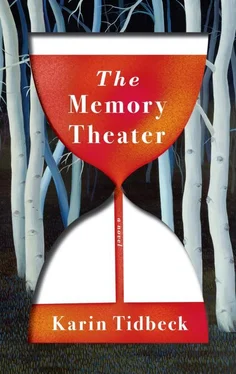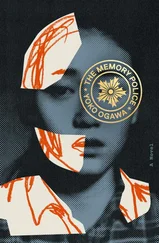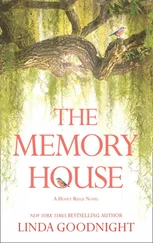The lords and ladies didn’t move through time like others did. They lived through the same evening, over and over again. They rose from their beds, threw a party or organized a game, and reveled through the twilight until they fell asleep. Then they awoke from their stupor, and the party began anew. Their minds worked in loops; they would forget what they had done and remember things they hadn’t done yet.
Their servants, however, were children who had wandered into the surrounding forest from the outside, lured in by fairy lights and the noise of revels. The lords and ladies stole the children’s names, marking and binding each child to its new master, taking all but the faintest memories of their former lives away. But the children weren’t touched by the same ageless magic that surrounded their masters. They grew up, and the patterns that were carved into them became complete. When that happened, they were killed for sport and eaten.
“If I just had my true name back,” Thistle said, “I would be free from Augusta. We could run away from here before anything happens. And with my name I would remember where I came from and find a way back to my parents. You could live with us.”
“You’ve looked for your name everywhere,” Dora said. “You said it’s not written down, it’s not caught in a jar, it isn’t embroidered on a handkerchief.”
Thistle hung his head.
Dora pried Thistle’s fingers loose from where they were stroking her hair. “I won’t let her hurt you. Now tell my story.”
Thistle let out a shaky laugh. “How many times do you need to hear it?”
Dora smiled. “I like hearing it.”
“All right,” Thistle said. “Once upon a time there was a lonely lord called Walpurgis. He was rich and beautiful and comfortable, but he wanted a child. In this land, however, no one had children, for they had become timeless and forgotten how to make them.
“ ‘Oh, how I wish I had a child of my own,’ Lord Walpurgis would say, and put his head in his hands. ‘Someone who was part of me.’
“So it came to pass that a visitor arrived, a traveler who called herself Ghorbi, and she came from far away.
“Walpurgis sought her out, and said, ‘My good woman, will you help me? For I would like a child of my own.’
“ ‘I will help you,’ Ghorbi replied, ‘but you must know this: if you mistreat her, she will not be yours.’
“Still, Walpurgis insisted, and he paid Ghorbi in precious stones. She took a bottle of his seed and went away. Then she returned, and she wasn’t alone.
“ ‘Walpurgis, I have your daughter,’ Ghorbi said. ‘This is Dora.’
“She stepped aside, and lo! There was a girl. She was as tall as Walpurgis, her shoulders broad and strong, her eyes dark as the earth, and her hair like white feathers.
“ ‘Father,’ said the girl, and her voice was like the blackbird’s song.
“ ‘She was grown from your seed in the earth,’ Ghorbi said. ‘She is half of the mountain, and half of you.’
“But Walpurgis hesitated. ‘I thank you for this gift,’ he said. ‘But this creature is too precious. I am not worthy.’
“ ‘A bargain’s a bargain,’ Ghorbi replied. ‘I have delivered what you asked for.’
“And then she was gone.
“Walpurgis had a good heart, but even though he tried, he couldn’t take care of Dora. He was simply not very good at being a parent, since he couldn’t recall ever being a child. The court was angry with him and demoted him to chamberlain, for they had all sworn not to bear children of their own.
“Walpurgis found a friend for Dora, a boy called Thistle, who was a page to the lady Augusta.
“The lords and ladies said, ‘You can take care of her better than we. Let her be veiled, lest we are reminded of our failure.’
“Thistle was happy to care for Dora. They loved each other like brother and sister.”
Dora closed her eyes. Her favorite part was coming.
“Finally, after being a terrible father, Walpurgis began to understand,” Thistle continued. “He finally understood what love was, and that he must take care of Dora. And so he took her back, and he saw how well Thistle had cared for her. And he promised to love her and asked her forgiveness for his neglect.”
“Really?” Dora asked.
Thistle stroked her hair. “Really.”
Far away, someone blew a whistle. Thistle carefully lifted Dora’s head and stood up.
“There’s a croquet game,” he said. “I have to go.”
Dora watched him walk out into the orchard, then followed at a distance.
Hidden behind an oak at the edge of the game lawn, Dora watched them play. She kept her veil drawn over her face. The pale lords and ladies loitered on the grass, leaning on croquet clubs and each other. Lady Mnemosyne watched from her seat on the podium, eyes shadowed under her wreath, her skirts spread out like a willow tree. Walpurgis lay on the grass at her feet, propped up on his elbow. The left half of his white coat was spattered with something sticky-looking. Next to him, the twins Cymbeline and Virgilia embraced on their divan. Cymbeline’s crinoline was covered in chestnut leaves; Virgilia’s dress was woven out of peacock feathers. At the edge of the lawn, Augusta’s sister Euterpe was already drunk, rolling around in the grass dressed only in a thin shift. Hyssop, Virgilia’s page boy, stood at attention nearby, holding a tray of drinks and sweetmeats. Like the other servants, he was good at not moving. Moving drew attention.
In the center of the lawn, surrounded by little arches stuck into the ground, the lady Augusta stared at a striped ball by her feet. She looked formidable in her brilliant blue coat and knee pants; her mahogany hair was freshly curled, her face a work of art. Thistle stood at her elbow, hands clasped behind his back, eyes wandering over the lawn. He looked into the trees and briefly met Dora’s gaze. His eyes widened a fraction, and he shook his head almost imperceptibly.
Augusta swung her club. The ball flew in a high arc and hit Hyssop. He dropped his tray and clutched his arm with a groan. The crowd on the lawn burst into cheers and applause. Mnemosyne smiled and nodded from her podium. When Hyssop straightened, Virgilia got up from the divan and slapped him. She pointed at the mess. Hyssop immediately kneeled to pick it up, his left arm shaking.
Dora watched as the game progressed. She had never understood the rules, but everyone broke into applause when the players hit the servants.
Augusta swung her club with flair; Thistle had to duck several times to avoid getting smacked. He fetched drinks when asked to and mopped the sweat from Augusta’s brow with a small handkerchief.
Dora almost ran out across the lawn when Lord Tempestis landed his ball in the face of Euterpe’s little page, Calla, but she knew she mustn’t. It would make things worse. Calla bled all over her doublet and spat something into her hand.
At cake break, they punished Hyssop for dropping the tray. Virgilia took his jacket and shirt off. Two flower stems reached up along Hyssop’s shoulder blades, and more of them meandered down his arms. Each servant had their special art, carved into them with teeth and nails: hyssop, calla, vetch, foxglove, others. And thistle.
Walpurgis and Cymbeline took each of Hyssop’s arms. Virgilia sank one of her long fingernails into her page’s right shoulder. Dora forced herself to watch. Hyssop deserved her bearing witness, at least. She had barged in, once, to defend a page. The lords and ladies had reacted quickly. They wouldn’t strike her like they would a servant; instead, they had immobilized her with their words, but not before Dora had knocked Cymbeline to the ground and made her cry. And for Dora’s rebellion, they had hurt Thistle.
Читать дальше










![Карин Тидбек - Аматка [ЛП]](/books/438406/karin-tidbek-amatka-lp-thumb.webp)

